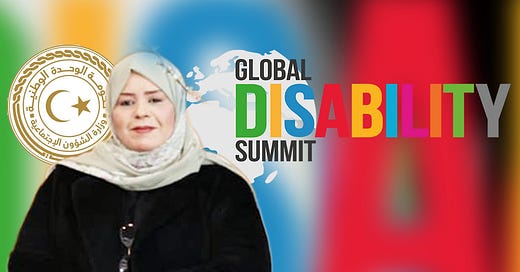Failure in Genuine Representation
The Deliberate Exclusion of Disability Activists from International Summits: Lack of Support and Failure in Genuine Representation
As expected, the Minister of Social Affairs, Ms. Wafaa Abu Bakr Al-Kilani, participated in the Global Disability Summit 2025, held on April 2-3 in Berlin, jointly organized by Germany and Jordan to discuss issues such as inclusive education, economic empowerment, and assistive technology. The summit brings together representatives from governments, international organizations, and the private sector to promote inclusion and the rights of persons with disabilities.
However, this participation highlights a deeper issue beyond mere official presence. The Libyan government continues to exclude disability activists from such events, while other countries like Egypt and Morocco support their activists in attending, recognizing them as the most capable of representing their issues. As a blogger and disability rights activist for years, I write about these issues because I experience them firsthand. I know that such symbolic participation does not reflect the harsh reality we face daily.
What Will the Minister Say at the Summit?
Will she claim that Libya has provided a supportive environment for persons with disabilities? Will she assert that public facilities are accessible? Or will she simply repeat official narratives that have no connection to reality, while the very people she claims to represent suffer from neglect, discrimination, and a lack of essential services?
The reality of persons with disabilities in Libya does not need embellishment or distortion but rather a frank acknowledgment and fundamental solutions. They remain deprived of medical insurance, social support, and accessible infrastructure, facing daily discrimination in their most basic rights, from mobility to education and employment.
Lack of Support: Deliberate Marginalization or Administrative Failure?
The government should have provided financial and logistical support to activists so they could attend the summit. Instead, most were unable to travel due to high costs and the absence of any official support. As a result, the true voices of the affected community were left unheard, while the opportunity for official representation was given to those lacking the competence or real understanding of disability issues.
The minister, who assumed her position through political quota rather than professional merit, has shown no real commitment to improving the conditions of persons with disabilities. Instead of working towards their genuine inclusion in society, she continues to present a distorted and misleading image of their reality.
Superficial Representation and Growing Frustration
It is clear that the minister did not attend the summit to find real solutions or build effective international partnerships but rather to use the event as an opportunity to legitimize her performance. Her participation without any genuine representation of persons with disabilities confirms that it was nothing more than a symbolic presence, while the reality tells a completely different story.
But the most critical question remains: Will the minister take responsibility for the massive gap between the reality of persons with disabilities in Libya and their counterparts in other countries? Will she feel embarrassed when witnessing the stark differences in services and rights? Or will she return to Libya and continue ignoring the truth while repeating misleading claims?
In the end, all we can say is: "God is our only refuge and the best judge" for every official who has neglected this community and for those who have exploited their suffering instead of seeking real solutions.



